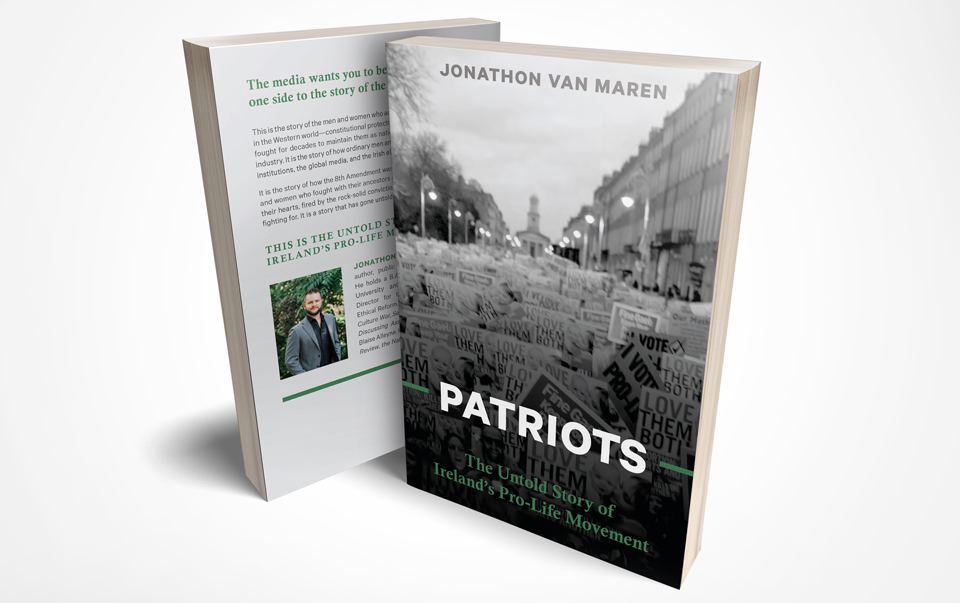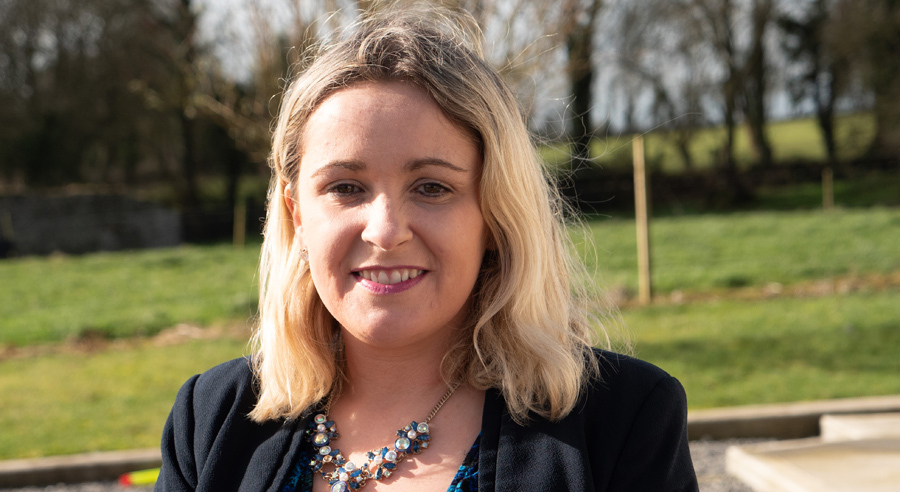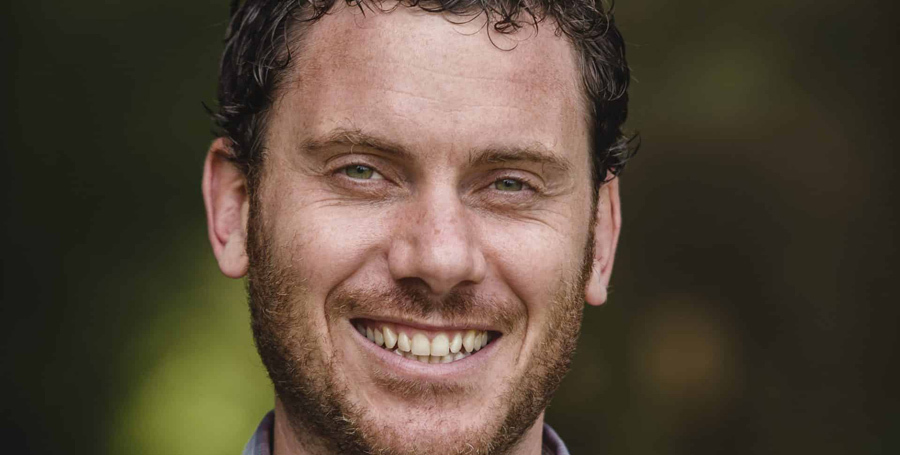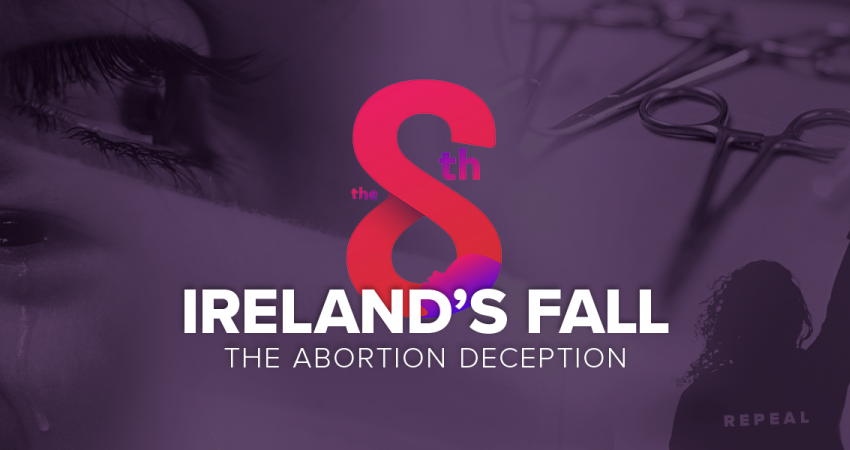BOOK: Untold Story of the Pro-Life Movement & Abortion Referendum
How Ireland saved hundreds of thousands of lives:

Yes! I would like to buy this book
The HISTORY of the Irish pro-life movement has been written.
This is the untold story of Ireland's pro-life movement, who succeeded in protecting women and children from abortion for decades after the rest of the world had made it legal to end the lives of preborn babies.
For thirty-five years, hundreds of thousands of lives were saved under Ireland's 8th amendment. At the same time, Irish maternal healthcare was also amongst the best in the world.
Ireland was described by abortion campaigners as the jewel in the crown of the pro-life movement - but that became one of the reasons why international funding poured into a campaign to repeal the 8th amendment.
On May 25th 2018, that legal protection for preborn babies was stripped away after a deeply divisive campaign which saw the media relentlessly spin the removal of the 8th amendment as being necessary to protect women's lives. While the international news stories focused on the result of the referendum, until now the history of Ireland's pro-life protections and the people, the movement, the events and campaigns that kept abortion at bay has never been written.
This is the untold story of Ireland's pro-life movement - of the ordinary men and women who did extraordinary work to ensure Ireland's unborn babies were protected for decades after most of the Western World had fallen to the abortion industry.
It is the story of how the 8th was won, how the 8th was lost, and how hundreds of thousands of lives were saved in between.
Jonathan Van Maren tells how Ireland's constitutional ban on abortion came about, how thousands of unlikely heroes, fought in anonymity for years to save children not their own, persevering in the face of a hostile culture, a contemptuous media, and powerful political opposition.
Too often, the stories of the pro-life movement are told by others. Too often, they are told by a pro-choice media who act more like attack dogs than journalists.
This is the real story of the thousands of people who put boots on the ground to fight tooth and nail for the life of every pre-born baby.
It is the story of the men and women who fought with their ancestors at their backs and their children in their hearts, fired by the rock-solid conviction that Ireland’s babies were worth fighting for.
It is the story of how they succeeded in that fight for decades and how the exploitation of a woman's tragic death was used as a battering ram to breach those defences.
It is the story of resilience and defiance that is, even now, raising up the movement once again.
It is time for this story to be told.
BUY THE BOOK DIRECTLY HERE!
Carol Nolan
"Jonathan Van Maren’s account of how Irish voters came to repeal the pro-life Eighth Amendment is a fascinating and timely cultural resource that deserves the widest possible readership. What emerges alongside the historical analysis, and the biography of a movement dedicated to the retention of a constitutional human rights beacon, is the most comprehensive account yet of just what it took at the human level to try and save the Eighth.
In many ways it was not an easy book to read. To be brought back to the boundless optimism and hope of those years, before the onslaught of media and political manipulation reminded me of just how different things might have been. For all of this, the book is an extraordinary historical testimony that also remains unflinchingly honest in terms of the lessons we need to learn for the future."
Carol Nolan, Independent TD for Laois / Offaly

REVIEW: ALIVE NEWSPAPER
By Derek Ryan
"Ireland was described by abortion campaigners as the jewel in the crown of the pro-life movement – and for decades the constitutional protection of the unborn was attacked repeatedly. On May 25th 2018, that legal protection for preborn babies was stripped away in the name of progressivism and modernity.
Not many know that the story of Ireland’s constitutional protection for the unborn began before the 8th Amendment to the constitution was introduced, in response to developments overseas where legal protection was removed by judicial over-reach and with little or no consideration of the popular view.
A small group of people with great foresight forged a spectacular political campaign to have the referendum on the 8th amendment take place in 1983, through the short-lived Pro-Life Amendment Campaign.
From that time until 2018, others inspired by this group fought off the establishment who sought to undo the 8th, through the UN and European Court of Human Rights, and exploiting sad and tragic cases in order to force through their ideological agenda.
Until now the history of Ireland’s pro-life protections and the people, the movement, the events and campaigns that kept abortion at bay had not been written down, and Jonathon van Maren does a service to Ireland in documenting the 40 year history of this movement.
For those not old enough to remember the people who started this movement, the book provides insights into the pre-8th amendment years, and demonstrates its importance as the primary sources documenting those years were written by those that opposed the unsung heroes.
As I went through the book, quite quickly as it flows so well, I found myself wanting to know more about the founding fathers and mothers of the movement, demonstrating just why this chronicle is so important. It captures the story of these heroes whose memories would be forgotten and first hand accounts no longer possible.
Reading the book will bring back painful memories for many – the hurt, the sadness, the disappointment of what the removal of the 8th amendment means for Ireland for unborn children. It will also remind us of the anger at witnessing our Taoiseach and Minister for Health joining the crowds in Dublin Castle to sing and dance at what they had just done.
History, they say, is written by the winners. No doubt in the long run, as those who voted to kill off their descendants, have sown the seeds of their own defeat, the winners are those who fought to defend the life of the voiceless. The next generations should know who those people were and that not everyone danced on the graves of the unborn"
REVIEW: CHARLES C CAMOSY, CRUX
Legalization of abortion produced ‘identity crisis’ for pro-life Irish Catholics
Stones placed by pro-life supporters are part of a silent demonstration Nov. 30, 2019, in Belfast, Northern Ireland. (Credit: Brian Lawless/Reuters via CNS.)
[Editor’s Note: Jonathon Van Maren is a public speaker, writer, and pro-life activist. His commentary has appeared in National Review, First Things, The American Conservative, the National Post, and elsewhere. Van Maren is the author of The Culture War and Seeing Is Believing: Why Our Culture Must Face the Victims of Abortion as well as the co-author with Blaise Alleyne of A Guide to Discussing Assisted Suicide. He spoke to Charles Camosy about Patriots: The Untold Story of Ireland s Pro-Life Movement.]
Camosy: I must admit, knowing that the final chapter covered the loss of the 8th Amendment protecting equal justice under law for prenatal children under Irish law, a bit of hesitancy to get invested into a story which culminates in that tragic loss. Did you share any of that in making a decision to write this book? And what ultimately drove you to take on this project in the first place?
Van Maren: Interestingly, it was the loss of the 8th Amendment that drove me to research and tell this story. I was in Ireland for a few weeks prior to the 2018 abortion referendum, and the pro-lifers I met there crisscrossing the country, going door-to-door, and putting up with the contempt of the media and the betrayals of so many politicians were simply some of the best people I’ve met. And yet, the narrative of what happened started taking shape before the vote: That a movement of progressives and feminists saved Ireland from a handful of misogynist, medieval men and women driven to fanaticism by religion.
Like any pro-lifer, I’m used to narratives of that sort. But this time, it genuinely upset me. To see so many men and women who fought for decades and saved hundreds of thousands of lives—and then left everything on the field to save Ireland’s constitutional protection for the pre-born—slandered in this way was disgusting. These people fought for the children of others because they cared so deeply. I remember one elderly woman on the Life Canvass, moving slowly from door to door in Dublin. Someone told her that he’d be voting for repeal, and the woman said, in a trembling voice: “But what about the babies?” That’s why so many people took off work, skipped university classes, and poured their own time and money into the pro-life movement.
We in the pro-life movement rarely tell our own stories. As a result, our stories are told by those who slander us, hate us, and at the end of the day, do not understand our motivations. (Recent smear jobs include Norma McCorvey and Phyllis Schlafly.) I thought it would be a crying shame if the beautiful history of the Irish movement ended up being told by a handful of pro-choice journalists and abortion activists.
What lessons can the US, Canadian, and other pro-life movements around the world learn from the “glory days” of the Irish pro-life movement?
There are many answers to this question. First, the Irish movement was relentless. Keep in mind they were putting activists on the streets every day in a country where abortion was already illegal. They took nothing for granted, and they refused to be reactive. One of the reasons Ireland held on for so much longer than the rest of the West is that they responded to every threat as if it were existential, because it was.
The Irish movement has also given much to the international pro-life cause. For example, the Dublin Declaration, a document signed by over 1,000 medical professionals affirming that abortion is never necessary to address the health circumstances of the mother, is used by pro-lifers around the world in debate, on campus, and in street outreach. From embryonic stem cell research to difficult health circumstances, the Irish movement was always ready to present a compelling and coherent response to the deceits of the abortion industry, and to take those arguments to the streets and millions of doorsteps. They perfected the fusion of advertising, activism, and the distribution of essential information.
What lessons can such movements learn from the stinging defeat that the loss of the 8th Amendment represents?
To cite just one: That the media, the abortion industry, and the politicians will exploit any crisis—and any corpse, to put it crudely—to get abortion on demand. The tragic death of Savita Halappanavar was used as a blood libel against the pro-life movement despite the fact that every inquest and investigation proved that she died of septicemia, and that she did not need an abortion to save her life. That fact was buried. The false narrative that the 8th Amendment killed a woman—and would kill more—was relentlessly pounded into the consciousness of Middle Ireland. During the final week leading up to the referendum, abortion activists were simply hanging up photos of her face.
That story—the story of how the 8th was actually lost—also needed to be told.
One often hears folks say that the fall of the 8th can be directly connected to the fall of the Catholic Church more generally in Irish society. What’s your take on this?
It was definitely a significant factor, but can be somewhat overstated. Without Savita’s death, it is unlikely that the abortion activists would have been able to achieve repeal of the 8th, at least this time around. That said, the hatred and hostility of many young people towards the Catholic Church is very real and very vitriolic. I examine the impact of secularization and how scandals in the Catholic Church deeply damaged her moral standing in Ireland in the book. For example, many clergy did not speak up during the referendum for fear that their endorsement of the pro-life cause might accomplish the opposite of the intended effect.
As a person with 50 percent Irish heritage myself, I took great pride in being Irish and couldn’t wait to go back to visit. Now, however, I must admit feeling ashamed that a people with which I so closely identified could have done something like this. Any advice for folks like me? Do we have any reason for short- or medium-term hope that Ireland can work toward protecting and supporting both prenatal children and their mothers under Irish law?
You are not alone in this. In fact, the loss of the 8th Amendment triggered an identity crisis for many Irish pro-lifers, something I detail in the final chapters. That was a question that came up often: If Ireland is no longer pro-life, what does it mean to be Irish? It was that question that partially inspired the title to the book, Patriots. It has often been a minority fighting for a righteous cause, and the Irish have a tradition of this. For inspiration, the Irish need only to look to her own past—including the pro-life heroism I detail in my book.
In terms of what comes next, the Irish are now fighting a battle that resembles the fight in other nations. That said, keep in mind that 33 percent of voters cast their ballots to keep abortion illegal in all circumstances. That is a solid base to work from. I forget precisely where I read this quote, but after one referendum loss in another country, the spokesman for the losing side noted that there had been much support for their position, and that the battle would begin anew immediately. To paraphrase his words: “Let us start from 33 percent.” I have every confidence in the ingenuity and tenacity of the Irish movement.
REVIEW: JOHN JALSEVAC
There’s a powerful moment in Patriots, Jonathon van Maren’s brilliant new book about the Irish pro-life movement’s decades-long battle to keep the Emerald Isle abortion-free.
The date is May 24, 2018 — the vigil of the referendum on the Eighth Amendment to the Irish Constitution. This amendment, passed by popular vote in 1983, explicitly recognized the right to life of the unborn. It was the bulwark that kept abortion from Ireland’s shores for decades, even as nearly every other Western nation fell to the abortion regime. But on this day in 2018, it was hanging by a thread.
It is late at night, and a group of sleep-deprived pro-lifers has gathered for drinks at a pub in Dublin, around the corner from their headquarters. The preceding months have been consumed by an exhausting, all-out effort to counter the tsunami of propaganda, lies, money, and power — all in support of abortion — sweeping their nation. Ireland’s pro-lifers have left everything on the mat. Many of them have taken leaves of absence from work, or skipped a semester of school, just in order to be able to volunteer full time for the cause.
But on this night, with the vote scheduled for the following day, there is nothing else to be done. After having traveled to hundreds of towns and cities, distributed hundreds of thousands of pieces of literature, knocked on tens of thousands of doors, debated with countless voters on the streets, and protested and strategized and polled and marketed and lobbied using every technique that had proved successful over the past 3 1/2 decades … all that is left now is the waiting. The question on everybody’s mind is: Has it been enough? When the dust settles tomorrow night, will Ireland still be a pro-life nation?
Van Maren’s description of the scene is chilling:
Despite the hopefulness, everybody was tense. If pro-life Ireland would come through once again and victory awaited on the other side of the night, then everybody wanted to fast-forward to that moment of exquisite relief and jubilation. But if not — if May 25 would bring the devastating news that the Ireland they all loved so much no longer existed, and that the Irish people would be the first to bring in abortion by popular demand — then this night could last forever. Here, in this moment, everything was still as it should be. Babies in the womb were protected, Ireland was one of the only pro-life nations in the Western world, and being Irish still meant something profoundly beautiful. Here, on this island of sanity surrounded by those who had sacrificed weeks, months, and years to pour out their hearts for Ireland’s children, was laughter and camaraderie. On the other side lay a new era of unthinkable and unknowable darkness. It was Schrodinger’s Ireland: Nobody knew if she was alive, or dead — and nobody knew if they wanted to know.
Unfortunately, we now know what they, on that night, did not. The Ireland that had served as a beacon of hope for every pro-life activist the world over, the Ireland that had proved by its rock-bottom maternal mortality rate that abortion was completely unnecessary to protect women’s health, had indeed died. On May 25, 2018, Ireland’s Day of Infamy, the Irish people voted by a staggering margin, 66 percent to 33 percent, to bury the Eighth Amendment, paving the way for a permissive regime of abortion-on-demand.
Judged solely by May 25, 2018, the Irish pro-life movement was a failure. And indeed, there is a sense in which that is the grim, undeniable truth. And yet, what Van Maren has accomplished in this book is to place that one, fateful failure within the context of a much larger story — a story that includes such a litany of near-miraculous success, success obtained and maintained through such a mixture of conviction, creativity, and sheer, dogged, daily sacrifice, that the effect is that one closes the book astonished and grateful that such a thing could ever be, and inspired to do homage to Ireland’s indomitable pro-life warriors by imitating their example in whatever way possible.
Truth be told, I was hesitant even to read this book. Having been brought up in the pro-life movement, and having worked in it for so long, it sometimes seems to me that there is little I could possibly read about it that would surprise me, or move me, or provide much in the way of new information. Besides anticipating a certain measure of boredom, I was little inclined to read a book that I already knew ended in a depressing defeat.
How wrong I was.
Van Maren is a Canadian pro-life activist who flew to Ireland in the weeks before the May 25 vote to witness and participate in the pro-life effort. However, his descriptions of the campaign to “Save the Eighth” only occupies the final third of the book. In the rest, he recounts the history and paints a portrait of a pro-life movement that operated on such a vast scale, and with so many triumphs over the years, and that enjoyed such widespread public sympathy, that most of us who have lived our lives in nations where abortion was legalized decades ago can scarcely even begin to imagine what that might even look or feel like.
This aspect of the book alone is worth the price of admission. For, even though the pro-life side ultimately lost, what emerges from Van Maren’s telling is a compelling picture of a modern, Western nation in which, until quite recently, the mere thought of legalized abortion was inconceivable to most of its residents, and in which, as a consequence, the pro-life cause and movement enjoyed enormous popularity and political power. And if this could exist once, then why not again?
Truth be told, most of us have been so steeped in media propaganda to the effect that being modern means legalized abortion, that we have unconsciously come to believe that maybe it is so: maybe, just maybe, being a healthy, wealthy, modern, and developed nation just is, for some unknown reason, inconceivable without legalized abortion. Maybe we pro-lifers are simply tilting at progress in our effort to keep child-killing at bay.
But what Ireland and Ireland’s sophisticated pro-life movement proved for so many decades is that this simply isn’t true. In vote after vote, in poll after poll, the Irish people again and again reaffirmed their conviction that they could do perfectly well without abortion. Even as Ireland thrived economically and socially, standing with head held high amid other world-class nations, her politicians, experts and citizens spurned foreign pressure to “get with the program” and legalize abortion.
The effect of Van Maren’s recounting of Ireland’s pro-life history is to elicit this exceedingly encouraging thought: if Ireland could do this, then we can do this. Ireland once showed us what was possible. And if she showed us once, she can show us again. And if not her, then some other nation, with sufficiently motivated and savvy and committed pro-lifers, who can carry the torch. Perhaps our nation.
This is the spirit of vigor and optimism that infuses Van Maren’s narrative. Van Maren is one of those pro-life activists for whom abortion is no abstraction. He has held the battered bodies of babies who have been aborted in his hands. He has no doubt of the righteousness of the pro-life cause. Furthermore, being a foreigner, Van Maren is free of the need to feign humility with respect to the accomplishments of the Irish pro-life movement. The result is that he conveys a sense of the life-and-death urgency of the cause, as well as the brilliance of the Irish pro-lifers who successfully kept at bay the international abortion juggernaut, that is bracing and deeply inspiring.
As Van Maren recounts in the introduction, as he worked alongside the Irish pro-lifers in 2018, it seemed to him that there was something different about them. He concluded that the difference was their “innocence.” “Not naivete, not at all — they certainly knew that they could lose the referendum.” But,
It was the sort of innocence one has when they possess both the courage to fight evil and the faith that good can defeat it. More than that, it was the faith that good could defeat evil again. Abortion activists had been striving to destroy and undermine the Eight Amendment for decades, but always the pro-life movement had fended them off. Time and again, the sweaty panic of the final countdown to the campaign’s end had given way to an explosion of celebration. … This time, it had to be that way, too. The dragon had to die, the knight had to win, and the innocents had to be saved.
Alas, that is not how things turned out on May 25, 2018. That day began a tragic new era in Irish history. To the many pro-life Irish who had in some cases dedicated their whole lives to keep Ireland abortion-free, it seemed as if that day the Ireland they knew died. It is not hard to pinpoint reasons for the change of fortune: the existence of a media class that had become almost universally pro-abortion, and that flagrantly and tirelessly campaigned to repeal the Eighth, and that had no qualms about distorting and outright lying to accomplish that end; a Catholic Church that entered (or, alas, in many cases, did not enter) the fray bruised and bloodied by scandals, and consequently lacking in moral authority; and incessant pressure from the powerful globalist community on Ireland to conform, etc.
Van Maren recounts and analyzes all of this, and much of what he tells is enough to make one’s blood boil. It seems certain that without the incessant drip-drip-drip of shameless media distortion and foreign pressure, May 25, 2018 could very well have turned out otherwise than it did. So much for democracy; so much for Irish independence, earned at the cost of the blood of so many patriots; so much for media objectivity; so much for truth, and human rights, and compassion.
But in the end, the value of Van Maren’s book is in telling the story of Irish pro-life heroism. Conservatives are not always very good at telling our own stories. Liberals are often far better at that. Most pro-lifers don’t like blowing their own horn. We value humility. But this can be taken too far, if it buries the heroism that has the power to inspire others to pick up the torch and fight for justice. Even if Van Maren’s book does nothing else but celebrate and honor the sacrifices of so many unsung heroes, and inspire but a handful of others to imitate their example, it will have been worth all the effort.
I will conclude — as does Jonathon — with this quote from one of those Irish heroes, Niamh Uí Bhriain. Abortion might now be “the new reality in this new, harsh, pitiless Ireland,” she said in the wake of the 2018 vote. “But that is not my country. As the actor John Connors said, May 25th was the most shameful day in Irish history — but it is not our shame, because we did not vote for this. Instead, that shame should be felt by (Minister for Health) Simon Harris, by (Taoiseach) Leo Varadkar, by the Irish media, and by those who were too cruel or too foolish to know that the only compassionate answer is to love both mother and child. This cruel abortion regime is a stain on what was once a proud, pro-life nation. Time, and the persistence of the few, will change that once more.”

REVIEW: LILA ROSE
"Patriots is the real story behind the headlines, bringing readers alongside the frontline battle for life in Ireland. If you’ve ever wondered what the pro-life movement is up against and how it continues to thrive amidst great adversity, this book is for you.
My friend Jonathon Van Maren skillfully documents Ireland’s strategic work fighting against an abortion industry hellbent on the death of preborn children. I am confident that abortion will end because people like Jonathon show us what it takes to lead and inspire a nation. This is a book every pro-life person should read."
Lila Rose, president of Live Action

Yes! I would like to buy this book!

